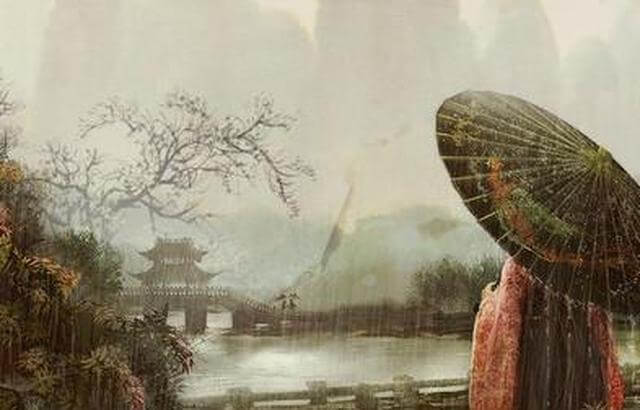To the Willow by the River
- Poetry of Yu Xuanji

翠色连荒岸,烟姿入远楼。
影铺秋水面,花落钓人头。
根老藏鱼窟,枝低系客舟。
萧萧风雨夜,惊梦复添愁。
The vendure of willows spread the riverbank,
i seem to see the tall attic through the mist.
In the river,the shadow of willow leaves dances.
i go fishing alone,willow catkins fall on my shoulders.
The roots of willow in the river become fish's nest,
the twigs of willow by the river clench transient's boat.
In this rainy night,wind breezes me coldly,do you know
how wishful i'm to wait for you come back to my pillow?
Yu Xuanji: 鱼玄机(AD844-871),she is a talented female poet in Tang poems.But because she got married with a bad boy.After she left her bad husband,she became a whore who lived in Xianyi nunnery( 咸宜观) where the cherry flowers bloomed.There she asked men to sleep with her.One day,her bondmaid Lv Qiao(绿翘) seized men with her.Because Lv Qiao grew up and also wanted men to sleep with her.Yu Xuanji went crazy and killed Lv Qiao.Finally,she was sentenced to death
- Why Chinese poems is so special?
- The most distinctive features of Chinese poetry are: concision- many poems are only four lines, and few are much longer than eight; ambiguity- number, tense and parts of speech are often undetermined, creating particularly rich interpretative possibilities; and structure- most poems follow quite strict formal patterns which have beauty in themselves as well as highlighting meaningful contrasts.
- How to read a Chinese poem?
- Like an English poem, but more so. Everything is there for a reason, so try to find that reason. Think about all the possible connotations, and be aware of the different possibilities of number and tense. Look for contrasts: within lines, between the lines of each couplet and between successive couplets. Above all, don't worry about what the poet meant- find your meaning.
List of Chinese poets
Pre-Qin Poetry
Han poetry
Ban Gu Cao Cao Cao Zhi Cao Pi Cai Wenji Kong Rong Liu Bang Liu Che Qin Jia Ruan Ji Su Wu Wang Can Xiang Yu Xu Gan Zhang Heng AnonymousSix Dynasties Poetry
Tao Yuanming Zhang HuaTang poetry
Bai Juyi Bao Junhui Cen Shen Chen Zi'ang Cui Hao Chang Jian Cui Tu Chen Tao Du Fu Du Mu Du Shenyan Dai Shulun Du Xunhe Du Qiuniang Gao Shi Gu Kuang Gao Pian Han Yu He Zhizhang Han Hong Huangfu Ran Han Wo Huang Chao Jia Dao Jiaoran Jin Changzu Li Bai (Li Po) Li He Li Shangyin Liu Yuxi Liu Zongyuan Luo Binwang Li Qi Liu Changqing Lu Lun Li Shen Li Yu Li Qiao Li Yi Liu Fangping Liu Zhongyong Li Ye Meng Haoran Meng Jiao Ma Dai Pei Di Qian Qi Quan Deyu Sikong Shu Song Zhiwen Shen Quanqi Shangguan Wan'er Xuanzong of Tang Wang Bo Wang Changling Wang Wei Wang Zhihuan Wei Yingwu Wen Tingyun Wang Han Wei Zhuang Wang Wan Xue Tao Xu Hun Xu Hui Yuan Zhen Yu Xuanji Yu Shinan Yuan Jie Zhang Jiuling Zhang Ji Zhang Hu Zhang Zhihe Zu Yong Zhang Xu Zhu Qingyu Zheng Tian Zhang Bi Zhang RuoxuSong Poetry
Cai Xiang Chao Chongzhi Fan Chengda Fan Zhongyan Huang Tingjian He Zhu Kou Zhun Jiang Kui Lu You Li Qingzhao Liu Yong Mei Yaochen Ouyang Xiu Pan Lang Qin Guan Qian Weiyan Su Shi Su Zhe Song Qi Wang Anshi Wen Tianxiang Weng Juan Xin Qiji Yang Wanli Yue Fei Yan Jidao Yan Shu Ye Shaoweng Zeng Gong Zhang Xian Zhou Bangyan Zhu Shuzhen Zhu Xi Zhou DunyiYuan poetry
Bai Pu Guan Hanqing Ma Zhiyuan Xu Zaisi Yang WeizhenMing poetry
Chen Jiru Tang Yin Tang Xianzu Xu Wei Yu Qian Yang ShenQing poetry
Cao Xueqin He Shuangqing Nalan Xingde Pu Songling Tsangyang Gyatso Wang Guowei Yuan Mei Zheng Xie Zhao Yi